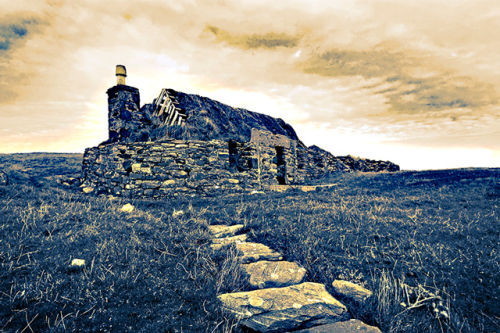Between Two Worlds: Teacher's Notes for David Morley's 'Taken Away' by David Morley
Writing about web page http://sounds.bl.uk/resources/teachersnotes.pdf

Taken Away
The mother places her baby at the waterfall’s brim.
She waits for the moon’s climb.
They’d been hard at the hay with a blunt scythe between them
circling and slashing for hours under blanking sunlight
with the cradle nestled and nooked on the one hayless place.
They’d had their breakfast, porridge and milk and tea,
scones, cheese, whatever they had. Their picnic things
were scattered on the green knowe around the cradle
as if plates and pots and pans had been tossed out by the baby.
The wife shadows her husband with a wide wooden rake
weaving and whirling his handwork as he worries the hay loose.
You know how a man makes bouts of hay with a scythe
and round and round the field in close and closing spirals
he rounds on the hayless knowe and that one white cradle
with cups and greaseproof wrappings pallid with butter;
like a maze of mauve leading into a green eye and an unseen
staring gap among the eye’s blades. Some small wind shoves
the grass as if a snake were sidling. The parents are heads down.
Their muscles move with each other as if they were making love.
Round he goes, and round she goes, a buzzard’s marriage
on a thermal. Then a cry goes up as if the soil were screaming
or the wind were wounded on nails of brittle straw. A cry
neither parent has heard and cannot stem with any known thing,
not milk or love or kiss or words or food. The young doctor
from across the glen hears the child’s call across five miles.
He rides towards it as if the cry were a fire rising in the fields
but all his knowledge’s clear water will not quench the child.
And so it goes for the fever of three thickening months
except at the wick of midnight when the baby closes down
as if his switches had been thrown, or some wires scissored
in his throat. Tethered by their child, the parents thaw into sleep
only to freeze awake at dawn as the cry bursts back alight.
Folk keep away. Folk catch that cry in their cattle’s eyes; taste
its scum in their milk and mutton.
At summer’s flow, the postman
deaf with listening to a lifetime’s stories, strode into their cottage,
downed a dram, and drank the scene into his memory: salt water
damming a child’s throat, a cry that would not cease for love.
He stayed with him all day. The parents scrammed for provisions
and the cure of quiet. As the door slammed and their footfalls
slapped into the lane, the postman turned to the baby and the baby
sat up asking if they had gone and, if his parents had gone
would that now mean he could get up at last—and get up he did
as if he were a young man sternly sick of his own board and bed.
He could stand and speak. The child’s voice was dark and thrown
as if four corners of the room were talking with him or through him.
The child clenched the whiskey bottle and downed enough to throw
a horse. He drew a long straw and slit it to the note of a flute.
Then he played the long day through, making the postman drink
deeper and harder than he had the head or height or heart for.
A moon widened on the windows; a garden gate squeaked
cringing on its hinges; the parents poured through the door
to find their child crying in his cot like a seal left on some low ledge
of the Atlantic; and the postman pointing at him, adrift or bereft.
‘He’s not here, your child. He’s not anywhere. He’s taken away.
He told me everything, how you left him to the cloud and sky,
left him to the harebell and the grasshopper and the cow parsley,
left him in grazed gaps between grass, to skylark and to hoverfly,
while you worked, if that’s what you were doing.’ They knew
one cure, one pure matter passed from their grandmothers.
When midnight massed itself over breakers and shore,
when the tide of the day had flown, mother, father and friend
headed by torchlight up the headstream on the high moor.
The mother slides her fairy-baby towards the waterfall’s brink,
taut-shawled, his baby arms pinioned like a wrapped cat.
The child’s mewling, breathing the breath of the chilled spray
slaping up from the trout-brown pool at the fall’s foot.
The father and their friend are behind her, egging her on,
baying that it’s for the best, that their child isn’t in the child.
The moon bends a bow behind a cloud-castle then shoots
its light-arrow through a slit across the waterfall’s rim.
David Morley's Blog
- David Morley's profile
- 13 followers



